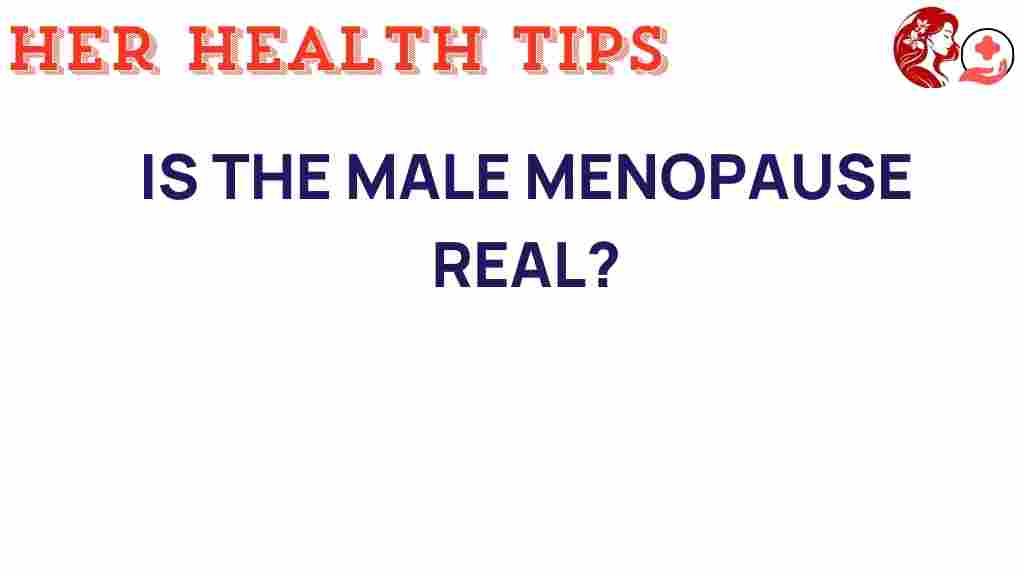Unveiling the Truth: Is Male Menopause a Reality or Myth?
In recent years, the term male menopause has gained traction, leading to discussions about whether aging men experience a form of menopause similar to women. This phenomenon, often referred to as andropause, encompasses various hormonal changes that occur in men as they age. As society becomes more aware of men’s health issues, it’s crucial to understand the truth behind these health myths, the effects of aging on testosterone levels, and the implications for overall wellness.
Understanding Male Menopause (Andropause)
Male menopause, or andropause, refers to the gradual decline in testosterone levels that many men experience as they reach middle age. Unlike women, who undergo a clear and defined cessation of reproductive hormones during menopause, men experience a more subtle and gradual hormonal shift.
Here are key aspects of male menopause:
- Aging Process: Testosterone levels in men typically peak in their late teens to early 20s and begin to decline by about 1% per year after the age of 30.
- Hormonal Changes: The decline in testosterone can lead to various physical and emotional symptoms.
- Health Myths: Many misconceptions surround male menopause, leading to stigma and misunderstanding.
Symptoms of Male Menopause
As testosterone levels decrease, men may experience a range of symptoms that can be attributed to andropause. Common signs include:
- Fatigue and decreased energy levels
- Reduced libido and sexual dysfunction
- Depression and mood swings
- Increased body fat, especially around the abdomen
- Loss of muscle mass and strength
- Difficulty concentrating or memory problems
It’s essential to note that while these symptoms can be linked to hormonal changes, they can also stem from other health conditions or lifestyle factors. Therefore, a thorough evaluation by a healthcare professional is crucial for an accurate diagnosis.
Causes of Hormonal Changes in Aging Men
The decline of testosterone levels in aging men can be attributed to several factors, including:
- Natural Aging: As men age, the body’s production of testosterone naturally decreases.
- Health Conditions: Chronic illnesses such as obesity, diabetes, and hypertension can affect hormone levels.
- Medications: Certain medications can interfere with testosterone production.
- Lifestyle Factors: Poor diet, lack of exercise, and high-stress levels can contribute to hormonal imbalances.
Midlife Crisis and Male Menopause
Many people associate a midlife crisis with significant changes in behavior and emotional distress. For some men, this period coincides with the onset of male menopause. The interplay between emotional health and physical changes can lead to a challenging time for aging men.
Symptoms of a midlife crisis may include:
- Feeling unfulfilled or dissatisfied with life
- Seeking new experiences or changes in lifestyle
- Increased irritability or mood swings
- Questioning personal and professional choices
Recognizing that these feelings may be linked to hormonal changes can help men address their emotional health proactively.
Steps to Manage Male Menopause
Addressing the challenges associated with male menopause involves a multi-faceted approach to health and wellness. Here are some steps to consider:
1. Consult a Healthcare Professional
Before jumping to conclusions about your symptoms, it’s vital to consult a healthcare provider who specializes in men’s health. They can evaluate your symptoms and suggest appropriate testing to determine testosterone levels and other hormonal factors.
2. Lifestyle Modifications
Making changes to your lifestyle can significantly impact your overall health. Consider the following:
- Diet: Focus on a balanced diet rich in whole foods, lean proteins, fruits, and vegetables.
- Exercise: Engage in regular physical activity, including strength training and cardiovascular exercises.
- Sleep: Prioritize quality sleep, as it plays a crucial role in hormonal balance.
- Stress Management: Practice stress-reduction techniques such as mindfulness, meditation, or yoga.
3. Hormone Replacement Therapy (HRT)
In some cases, hormone replacement therapy may be recommended to restore testosterone levels. This treatment needs to be discussed thoroughly with a healthcare provider, weighing the benefits against potential risks.
Common Health Myths About Male Menopause
Many myths surround the concept of male menopause. Addressing these misconceptions can help men understand their health better:
- Myth 1: Male menopause is the same as female menopause.
Reality: Male menopause is a gradual decline in testosterone rather than a sudden cessation. - Myth 2: Only older men experience andropause.
Reality: Some men may experience symptoms in their 30s or 40s, though it’s more common in older men. - Myth 3: Hormonal changes are not significant.
Reality: Changes in testosterone can have a profound effect on a man’s physical and emotional health.
Troubleshooting Tips for Aging Men
If you suspect you are experiencing male menopause, here are some troubleshooting tips:
- Keep a Symptom Diary: Track your symptoms, energy levels, and mood changes to identify patterns.
- Discuss with Partners: Open dialogue with partners can help address sexual health issues and emotional concerns.
- Seek Support: Consider joining support groups for men experiencing similar challenges.
- Stay Informed: Educate yourself about men’s health and hormonal changes through reputable sources.
Conclusion
In summary, male menopause, or andropause, is a reality for many aging men, characterized by hormonal changes that can impact physical and emotional health. Understanding these changes can help men navigate their health more effectively and dispel the myths surrounding this natural phase of life.
By consulting healthcare professionals, making lifestyle adjustments, and exploring treatment options, men can enhance their well-being during this transition. Remember, aging is a natural part of life, and taking proactive steps can lead to a fulfilling and healthy midlife and beyond.
For more information on men’s health and wellness, visit Men’s Health Network. To explore ways to improve your well-being, check out our health resources.
This article is in the category Wellness and created by HerHealthTips Team
